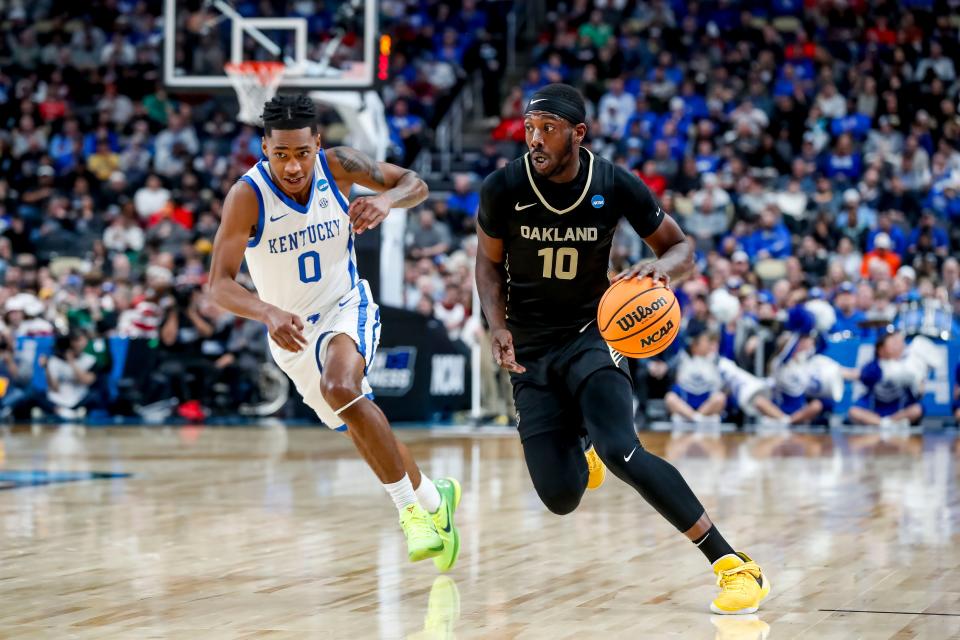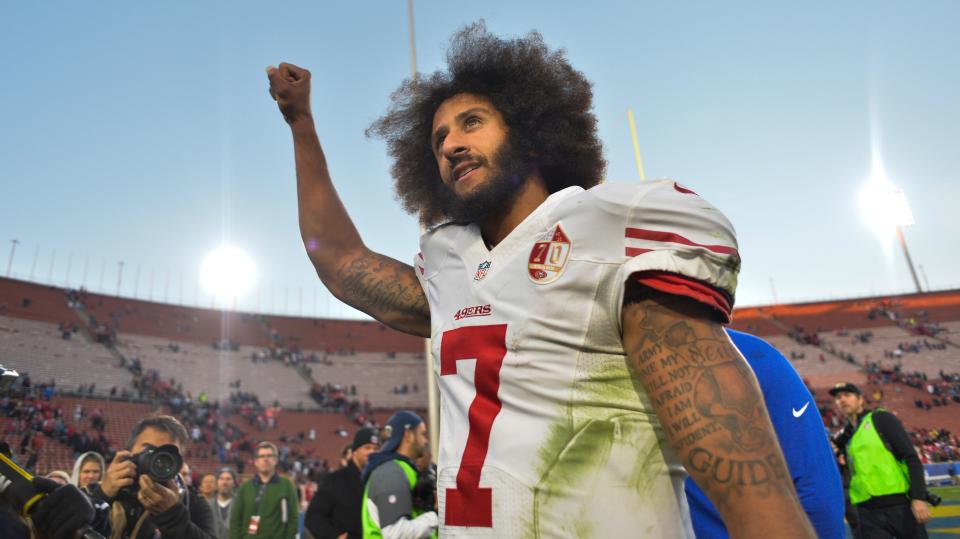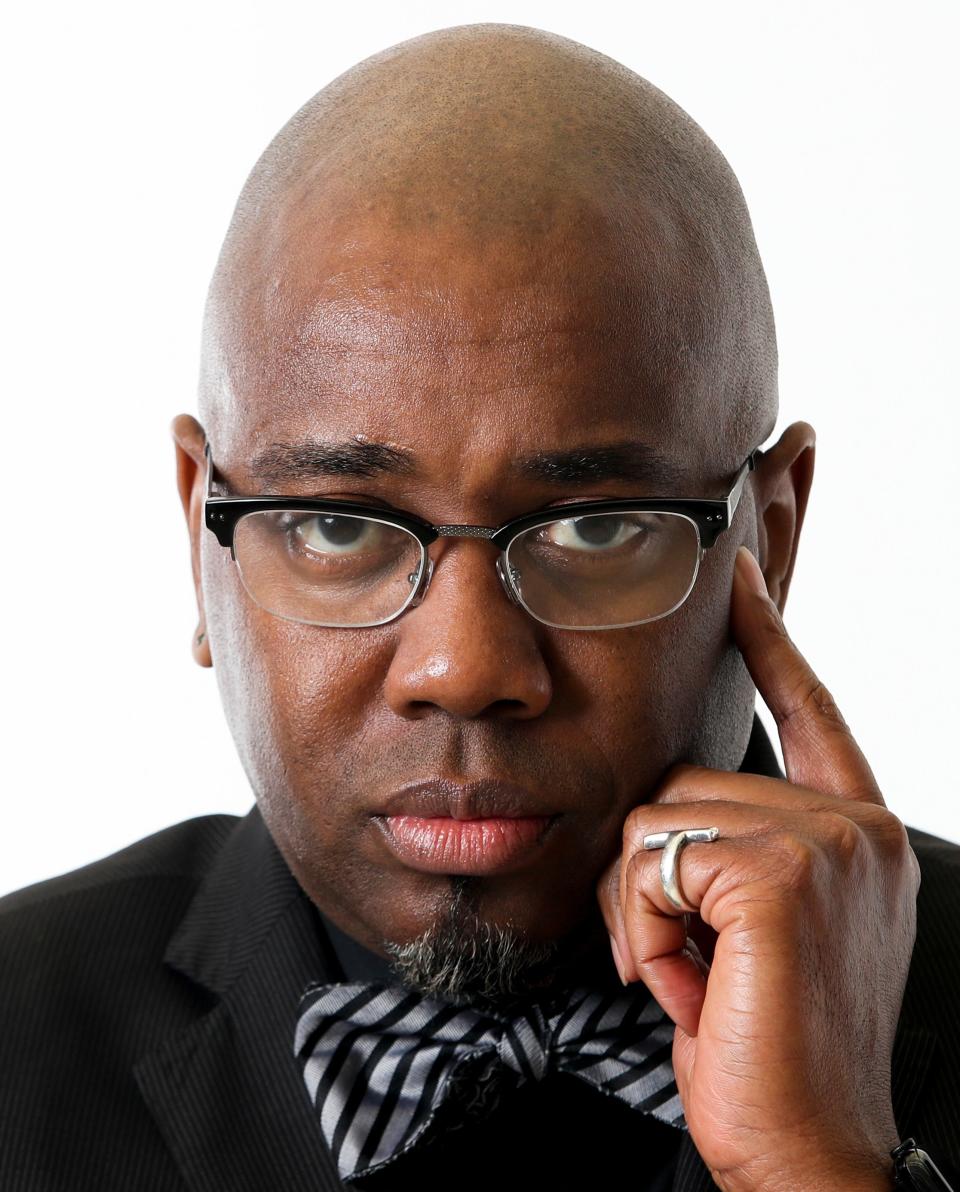Yes, Black athletes should disrupt March Madness in defense of diversity. They won’t.
- Oops!Something went wrong.Please try again later.
- Oops!Something went wrong.Please try again later.
University of Southern California professor Shaun Harper recently wrote a piece in Forbes titled, “Black athletes could upset March Madness and end attacks on DEI.” He rightfully points out that Black people represent a disproportionate percentage of college student-athletes who populate the high revenue sports of basketball and football at predominantly white institutions, both nationwide and in anti-DEI states. Magically, deceptive anti-DEI advocates and politicians never bring this up. Why? Maybe because these Black boys make white-controlled athletic conferences, universities, coaches, athletic directors, university presidents, television networks and others insane amounts of money.
Harper speaks of Birmingham, Alabama mayor Randall Woodfin encouraging Black athletes to steer clear of powerhouses like Alabama and Auburn if the state passed anti-diversity legislation. Well, Alabama obviously didn’t take Woodfin seriously, because Gov. Kay Ivey and her confederates joined Florida and Texas and passed such a law. Kentucky is on the brink of doing the same.
I'm a senior at U of L. Kentucky's anti-DEI bills would hurt Black students like me.
NAACP national president Derrick Johnson and others are calling for Black athletes to avoid Florida and, ostensibly, other states that are attacking diversity initiatives and Black access to higher education. They opine, “The imbalance of power and profit demands a response, particularly because these institutions reap considerable financial benefits from the very individuals they fail to stand by in matters of diversity, equity, and inclusion.” True. But is this enough to prompt the response they seek from Black athletes and their families?

Will Black athletes boycott anti-DEI universities?
It all comes down to Harper’s question, “Will Black student-athletes at the University of Alabama, Auburn, University of Florida, Florida State, University of Kentucky, [I would add the University of Louisville], University of Texas, and other sports powerhouses located in states where DEI has been banned also use their platforms to discourage others from enrolling at their institutions?”
Such questions about Black athletes standing against injustice are not new.
In 2017, legendary sportswriter Bill Rhoden chimed in when Donald Trump called Black athletes “sons of bitches” before a seething, mostly white crowd, ironically, in racially challenged Alabama. Trump was calling out the few who dared to support Colin Kaepernick’s protest of racism, brutality and inequality in America. Rhoden believed Trump (and much of white America) would not back down. To the contrary, he argued they would ramp up their attacks and opined, “This is a brawl.” The question then and now is, “are Black athletes prepared for it?” Sadly, in most cases, the answer to Rhoden’s query remains the same – no.
To be sure, most Black collegiate and professional athletes are anomalous human beings who possess unusual physical abilities. Once their gifts are identified, usually by adolescence, they are set upon a path that cultivates their athletic capabilities but often numbs their minds. Educational achievement and intellectual aptitude matter little to most recruiters, universities, coaches and academic advisors. Racial consciousness is absolutely inconsequential. In fact, it is usually discouraged. This is one reason Black athletes are rarely steered toward Black Studies classes by their academic advisors at PWIs. Ultimately, by design, they usually (not always) become intellectually underdeveloped Lilliputians with no serious racial, political or historical grounding housed within overdeveloped physical shells. Like good little entertainers, they’re trained to play their games, not resist, and only worry about money - which they rarely hold on to in the long run.

Rare athletes like Colin Kaepernick also possessed rare racial awareness
Men like Paul Robeson, Jim Brown, Kareem Abdul-Jabbar and Colin Kaepernick were not only rare athletes, they also possessed rare racial awareness. That is the reason most Black athletes did not stand with Kaepernick when he was white-balled. The support of the few who did quickly faded. Today, Kaepernick’s name and movement are rarely mentioned. His cause was ultimately co-opted, propagandized and neutered - and he was ghosted.
U of L is removing 'diversity' positions Black students should make them pay.
All things considered, it is not surprising that so few Black athletes stand up. It is actually remarkable that any of them ever do. Be clear, student-athletes will lose if they are left to stand alone — and they will in most cases as many fearful Black administrators, faculty and staff have muzzled themselves on PWI campuses. The ball players are completely unprepared for the assaults of white supremacy. They are too young and largely anesthetized by flawed education and socialization. Like most miseducated, misled and cowed Black people, they cannot adjust when debates dive into history, political ideology, structural marginalization or outright ignore core grievances and alter the discussions altogether.
Yes, Shaun Harper, Randall Woodfin, Derrick Johnson and others are all correct as they restate what many of us have been arguing for years. Black athletes could certainly upset March Madness and more. They could disrupt the anti-diversity movement in higher education. But they won’t. It is just another reality that makes the current crop of Black people in America easy prey for their enemies. So shut up and keep on dribbling, boys.

Dr. Ricky L. Jones is the Baldwin-King Scholar-in-Residence at the Christina Lee Brown Envirome Institute and Professor of Pan-African Studies, University of Louisville. His column appears bi-weekly in the Courier-Journal. Follow him on Facebook, LinkedIn, Threads, and X.
This article originally appeared on Louisville Courier Journal: Black athletes should disrupt March Madness for diversity’s sake
